Module 1 How to learn English Unit 1 Let’s try to speak English as much as possible教案
文档属性
| 名称 | Module 1 How to learn English Unit 1 Let’s try to speak English as much as possible教案 |
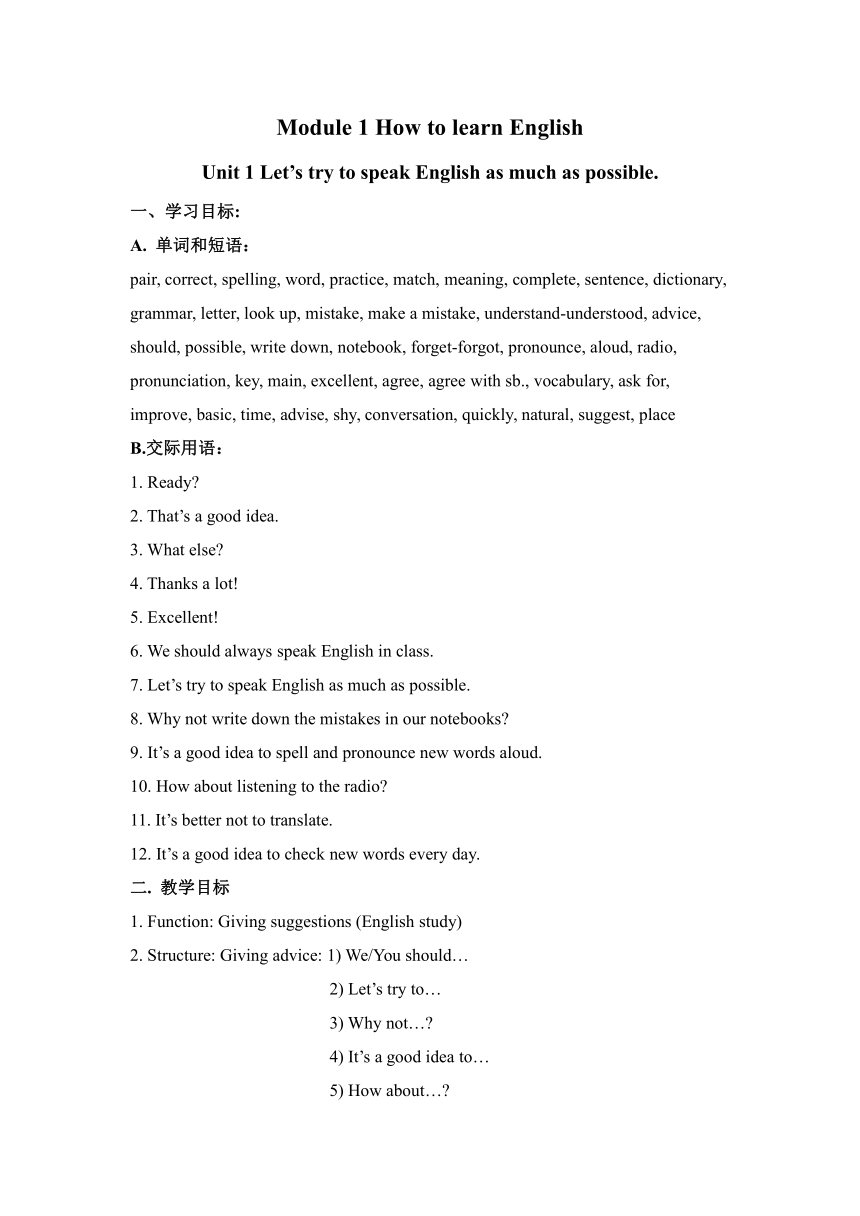
|
|
| 格式 | docx | ||
| 文件大小 | 46.4KB | ||
| 资源类型 | 教案 | ||
| 版本资源 | 外研版 | ||
| 科目 | 英语 | ||
| 更新时间 | 2024-08-15 00:00:00 | ||
图片预览

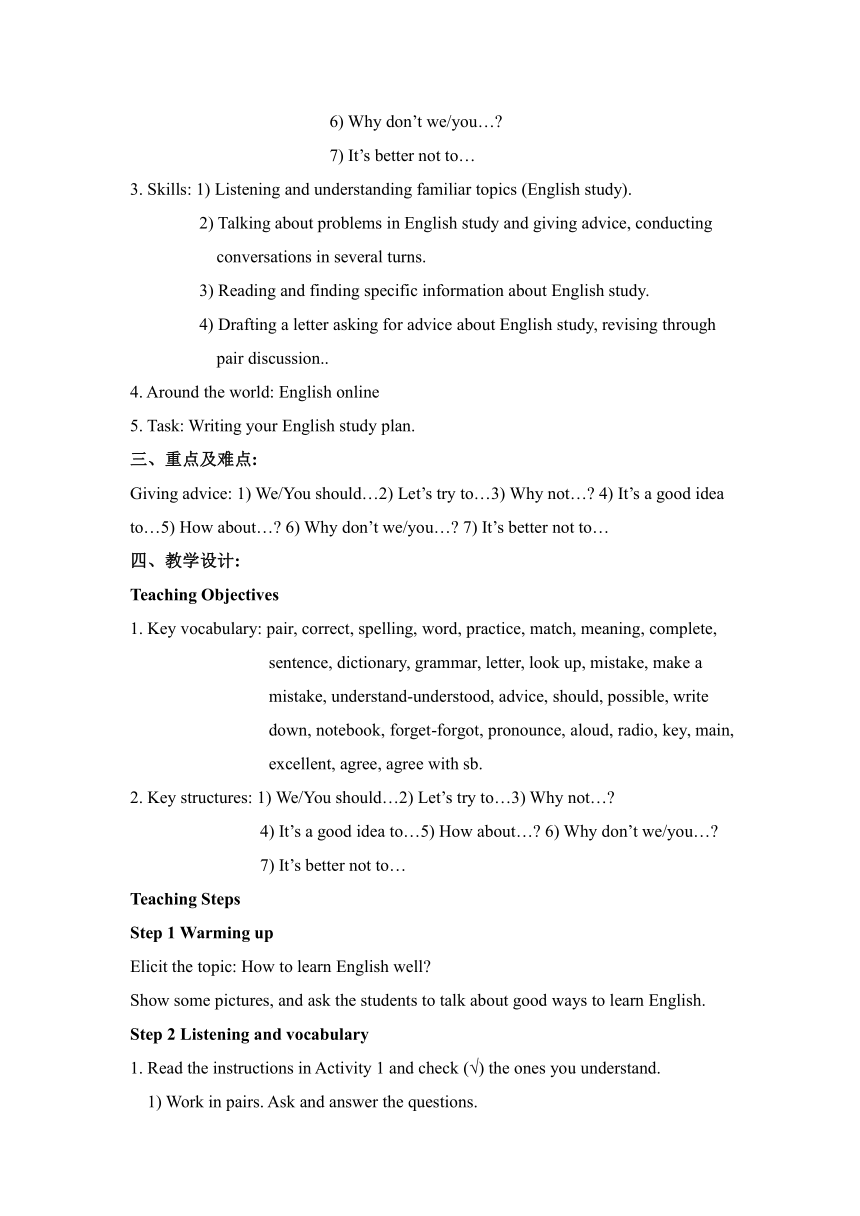
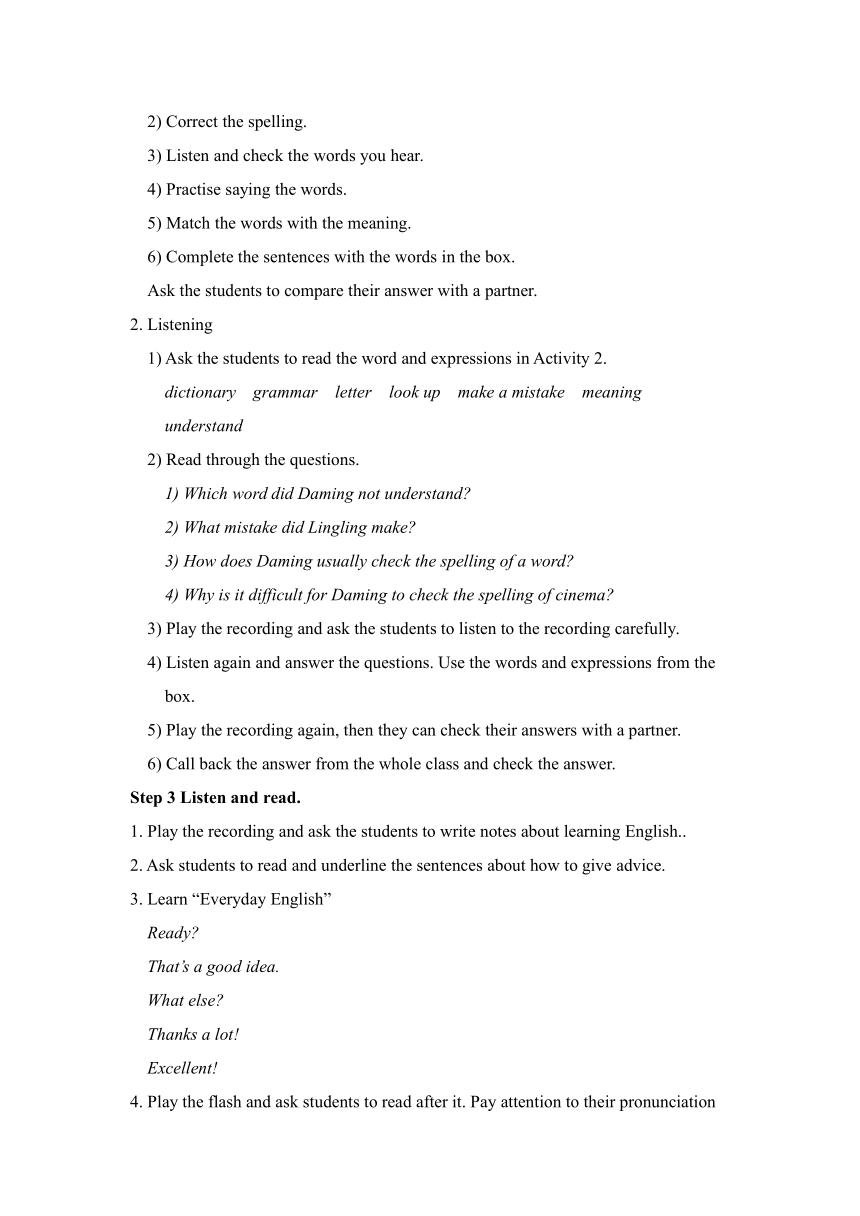
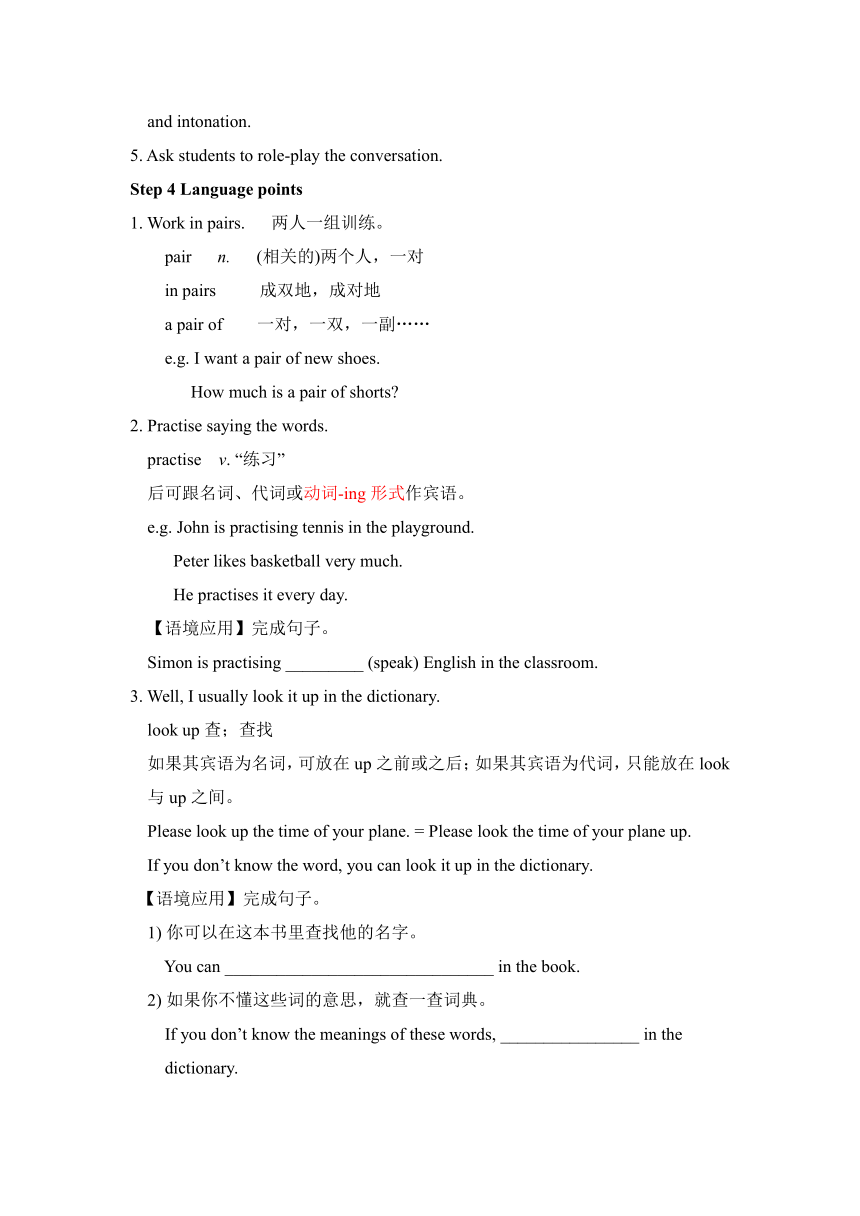
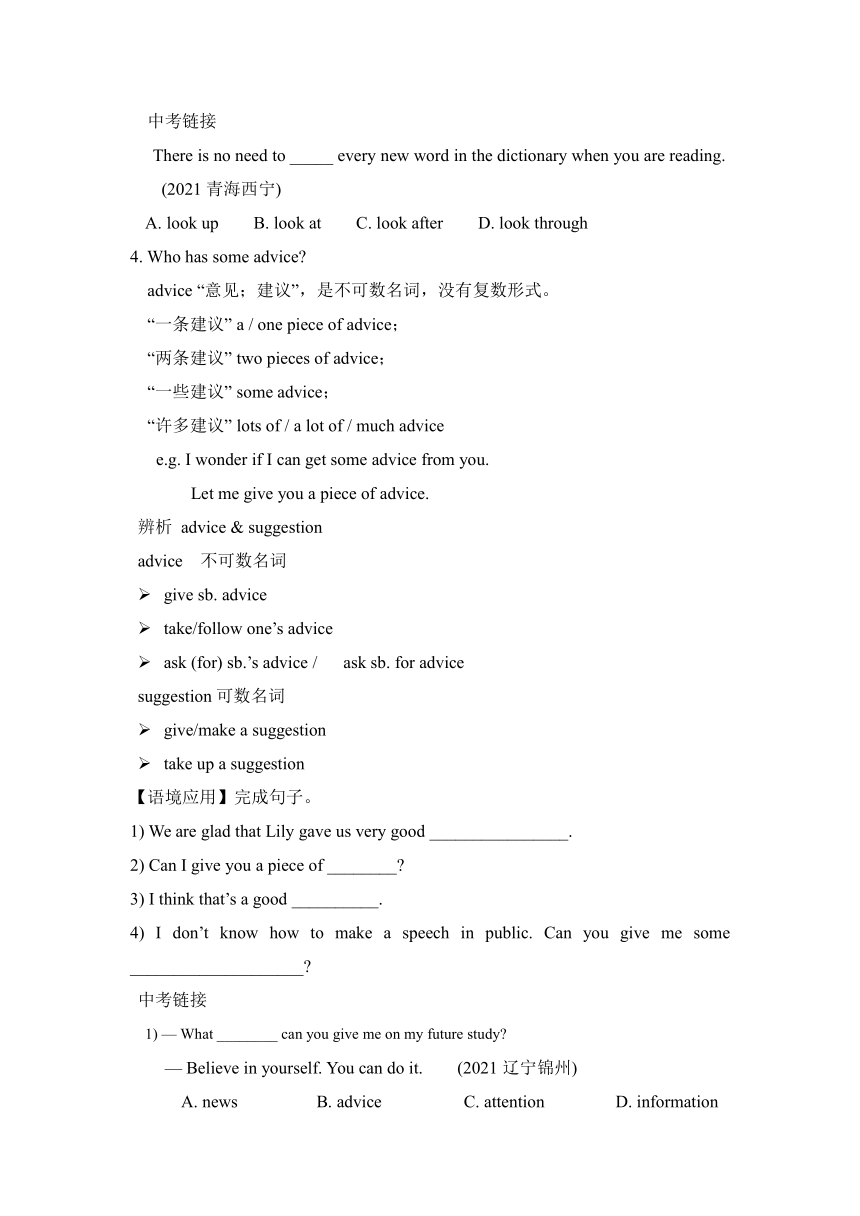
文档简介
Module 1 How to learn English
Unit 1 Let’s try to speak English as much as possible.
一、学习目标:
A. 单词和短语:
pair, correct, spelling, word, practice, match, meaning, complete, sentence, dictionary, grammar, letter, look up, mistake, make a mistake, understand-understood, advice, should, possible, write down, notebook, forget-forgot, pronounce, aloud, radio, pronunciation, key, main, excellent, agree, agree with sb., vocabulary, ask for, improve, basic, time, advise, shy, conversation, quickly, natural, suggest, place
B.交际用语:
1. Ready
2. That’s a good idea.
3. What else
4. Thanks a lot!
5. Excellent!
6. We should always speak English in class.
7. Let’s try to speak English as much as possible.
8. Why not write down the mistakes in our notebooks
9. It’s a good idea to spell and pronounce new words aloud.
10. How about listening to the radio
11. It’s better not to translate.
12. It’s a good idea to check new words every day.
二. 教学目标
1. Function: Giving suggestions (English study)
2. Structure: Giving advice: 1) We/You should…
2) Let’s try to…
3) Why not…
4) It’s a good idea to…
5) How about…
6) Why don’t we/you…
7) It’s better not to…
3. Skills: 1) Listening and understanding familiar topics (English study).
2) Talking about problems in English study and giving advice, conducting
conversations in several turns.
3) Reading and finding specific information about English study.
4) Drafting a letter asking for advice about English study, revising through pair discussion..
4. Around the world: English online
5. Task: Writing your English study plan.
三、重点及难点:
Giving advice: 1) We/You should…2) Let’s try to…3) Why not… 4) It’s a good idea to…5) How about… 6) Why don’t we/you… 7) It’s better not to…
四、教学设计:
Teaching Objectives
1. Key vocabulary: pair, correct, spelling, word, practice, match, meaning, complete, sentence, dictionary, grammar, letter, look up, mistake, make a mistake, understand-understood, advice, should, possible, write down, notebook, forget-forgot, pronounce, aloud, radio, key, main, excellent, agree, agree with sb.
2. Key structures: 1) We/You should…2) Let’s try to…3) Why not…
4) It’s a good idea to…5) How about… 6) Why don’t we/you…
7) It’s better not to…
Teaching Steps
Step 1 Warming up
Elicit the topic: How to learn English well
Show some pictures, and ask the students to talk about good ways to learn English.
Step 2 Listening and vocabulary
1. Read the instructions in Activity 1 and check (√) the ones you understand.
1) Work in pairs. Ask and answer the questions.
2) Correct the spelling.
3) Listen and check the words you hear.
4) Practise saying the words.
5) Match the words with the meaning.
6) Complete the sentences with the words in the box.
Ask the students to compare their answer with a partner.
2. Listening
1) Ask the students to read the word and expressions in Activity 2.
dictionary grammar letter look up make a mistake meaning understand
2) Read through the questions.
1) Which word did Daming not understand
2) What mistake did Lingling make
3) How does Daming usually check the spelling of a word
4) Why is it difficult for Daming to check the spelling of cinema
3) Play the recording and ask the students to listen to the recording carefully.
4) Listen again and answer the questions. Use the words and expressions from the box.
5) Play the recording again, then they can check their answers with a partner.
6) Call back the answer from the whole class and check the answer.
Step 3 Listen and read.
1. Play the recording and ask the students to write notes about learning English..
2. Ask students to read and underline the sentences about how to give advice.
3. Learn “Everyday English”
Ready
That’s a good idea.
What else
Thanks a lot!
Excellent!
4. Play the flash and ask students to read after it. Pay attention to their pronunciation and intonation.
5. Ask students to role-play the conversation.
Step 4 Language points
1. Work in pairs. 两人一组训练。
pair n. (相关的)两个人,一对
in pairs 成双地,成对地
a pair of 一对,一双,一副……
e.g. I want a pair of new shoes.
How much is a pair of shorts
2. Practise saying the words.
practise v. “练习”
后可跟名词、代词或动词-ing形式作宾语。
e.g. John is practising tennis in the playground.
Peter likes basketball very much.
He practises it every day.
【语境应用】完成句子。
Simon is practising _________ (speak) English in the classroom.
3. Well, I usually look it up in the dictionary.
look up查;查找
如果其宾语为名词,可放在up之前或之后;如果其宾语为代词,只能放在look与up之间。
Please look up the time of your plane. = Please look the time of your plane up.
If you don’t know the word, you can look it up in the dictionary.
【语境应用】完成句子。
1) 你可以在这本书里查找他的名字。
You can _______________________________ in the book.
2) 如果你不懂这些词的意思,就查一查词典。
If you don’t know the meanings of these words, ________________ in the dictionary.
中考链接
There is no need to _____ every new word in the dictionary when you are reading. (2021青海西宁)
A. look up B. look at C. look after D. look through
4. Who has some advice
advice “意见;建议”,是不可数名词,没有复数形式。
“一条建议” a / one piece of advice;
“两条建议” two pieces of advice;
“一些建议” some advice;
“许多建议” lots of / a lot of / much advice
e.g. I wonder if I can get some advice from you.
Let me give you a piece of advice.
辨析 advice & suggestion
advice 不可数名词
give sb. advice
take/follow one’s advice
ask (for) sb.’s advice / ask sb. for advice
suggestion可数名词
give/make a suggestion
take up a suggestion
【语境应用】完成句子。
1) We are glad that Lily gave us very good ________________.
2) Can I give you a piece of ________
3) I think that’s a good __________.
4) I don’t know how to make a speech in public. Can you give me some ____________________
中考链接
1) — What ________ can you give me on my future study
— Believe in yourself. You can do it. (2021辽宁锦州)
A. news B. advice C. attention D. information
2) --Thank you for the _____ you gave me.
--I'm glad they're helpful. (2021辽宁丹东)
A. suggestions B. advice C. news D. information
5. Why not write down our mistakes in our notebooks
Why not ... 用来表示提出建议,“为什么不……呢?;……怎么样呢?”。
Why not后接动词原形, 相当于Why don’t you … 。
e.g. Why not ask somebody else
Why not write a note and put it up on the wall
【语境应用】单项选择。
—I hear there’s a good French restaurant nearby. Why not ______ there for lunch
—Yeah, let’s go.
A. go B. going C. to go
翻译句子。
你何不在错误的旁边写下正确的拼写呢?
我们还可以用下面的表达方式来提建议:
① Shall we/I …
e.g. Shall we go boating
② Why not/Why don’t you…
e.g. Why not ask your teacher the questions
③ What/How about…
e.g. What about having some cakes
④ Let’s….
e.g. Let’s look at the books.
write down“写下;记下”,由“动词+副词”构成, 用法同look up。如:
The telephone number is very important. You should write it down.
Please write your name down on the paper. /
Please write down your name on the paper.
6. And don’t forget to write down the correct answers next to the mistakes. What else
forget v. “忘; 忘记”, 常用于两种结构中:
forget to do sth. “忘记要做某事(未做)”。如:
I forgot to close the window yesterday.
forget doing sth. “忘记做过某事(已做)”。如:
My mother forgot giving me a watch as a birthday present last year.
【语境应用】根据句意用括号内所给单词的适当形式填空。
(1) Don’t forget ________(take) your mobile phone when you go shopping.
(2) Amy forgot ________(tell) me the news yesterday, so she told me again this morning.
else通常用在疑问词后面, 可以表示“另外的, 别的”。如:
We have said we’re sorry. What else can we say
If I can’t trust you, who else can I trust
7. How about listening to the radio
How / What about ... “……怎么样?”,常用来提出建议或征求意见,其后常接名词、代词或动词-ing形式等。答语一般为“Good idea!”,“Excellent!”,“OK!”等。
【语境应用】Ⅰ. 词汇。
It is quite fine today! How about ______ (go) climbing this afternoon
Ⅱ. 单项选择。
1) —I feel stressed from time to time. Could you give me some advice
—______ sharing your worries with your parents
A. Why don’t you B. How about
C. Why not D. Would you like
2) —What about having a drink —______.
A. Help yourself B. Never mind
C. You’re right D. Good idea
8. I agree with you.
agree v. “赞同”,有两种常见用法:
agree with sb. 同意某人
agree to do sth. 同意做某事
e.g. I agree with you, Dad.
David agreed to have lunch in that restaurant.
【语境应用】完成句子。
1) 就这件事情,我同意你的观点。
I ______________ you on this matter.
2) Jenny同意帮我学习英语了。
Jenny ________________ me with English.
9. It’s a good idea to spell and pronounce new words aloud.
大声拼写和发音生词是个好主意。
本句中的it是形式主语,真正的主语是动词不定式to spell and pronounce new words aloud。
【拓展】
It is+形容词+of/for sb. to do sth, 形容词修饰宾语sb.时用of,修饰不定式时用for.
e.g. It’s very kind of you to help me.
It’s difficult for us to finish the work.
Step 5 Practice
Work on Activity 4 on page 3.
1. Ask the students to read through the passage and underline the correct words and expressions.
Here’s my (1) advice / notebook about learning English. Speak English (2) always / as much as possible in class, and listen to English (3) in the newspaper / on the radio. I (4) agree / forget it’s a good idea to look up new worlds in the ( 5) notebook / dictionary. You can find the (6) correct / excellent pronunciation and learn the meaning
2. Check with a partner.
3. Call back the answers from the whole class.
Step 6 Pronunciation and speaking
1. Play the recording once without stopping.
2. Play the recording again and ask the whole class to repeat.
1) We should always speak English in class.
2) Let’s try to speak English as much as possible.
3) Why not write down the mistakes in our notebooks
4) It’s a good idea to spell and pronounce new words aloud.
5) How about listening to the radio
3. Ask the students to listen and mark the intonation.
4. Now listen again and repeat.
英语有两种基本语调:升调和降调。
升调(↗)多用来表示 “不肯定” 和 “未完结”, 在一般疑问句、委婉的祈使句和打招呼的用语中。
降调(↙)表示“肯定”和“完结”, 一般出现在陈述句、祈使句和特殊疑问句中。感叹句中多用降调表示感叹。
Step 7 Work in pairs.
1. Ask students to talk about problems and give advice.
Problems Advice
I can’t… How / What about …
I don’t know… Why not / don’t you …
2. Read through the example with the class.
—I can’t speak English well. What should I do
—Why don’t you try to talk to our classmates in English?
3. Work in pairs.
Step 8 Exercises
Ⅰ. 根据语境,从方框中选择恰当的单词填空,注意形式变化。
understand, pronounce, notebook, advice, mean
1. There is a pen, a ruler and some _______ on the desk.
2. The Chinese _______ of the word “umbrella” is “雨伞”.
3. Mr Moore spoke very fast and very few people _______ him.
4. British English is different from American English in _______.
5. Mrs Clark gave us some _______ on learning English.
Ⅱ. 根据语境及所给首字母提示补全所缺单词。
1. You don’t look well. Maybe you s_______ see a doctor.
2. It’s a good idea to read English a_______ every morning.
3. Check your answers again and make sure they’re c_______.
4. Don’t f_______ to bring your homework to school tomorrow.
5. Mr Lee asked us to c_______ the sentences with the words in the box.
6. Now Lily p_______ playing the piano for two hours each day.
Ⅲ. 根据语境及所给汉语提示语写出所缺内容,每空一词。
1. The girls are _______ _______(谈论) their favourite songs.
2. Students are doing the exercises _______ _______(成对地).
3. Read the story and try to get its _______ _______(大意).
4. Please _______ _______ _______(写信给我) when you have time.
5. Sam _______ _______ _______(犯错误) in his homework yesterday.
6. Mark decided to _______ _______(同意) them about the plans for the holiday.
7. The man _______ _______(写下) his name on a piece of paper and gave it to me.
8. Mary asked me to _______ _______(查找) the opening times of the museum on the Internet.
Ⅳ. 根据对话内容,从方框中选择能填入空白处的最佳选项补全对话,其中有两项多余。
A: Hey, Amy. What are you doing
B: Hi, James. (1)_______
A: Tell the joke (笑话) to me. I want to hear it.
B: OK. (2)_______
A: Because seven ate nine!
B: (3)_______
A: It is an old joke. My sister told it to me before.
B: (4)_______
A: Right. Eight and ate sound (听起来) the same. But they have different spellings.
B: (5)_______
A: Yes, there are many such words in English.
A. That’s right! B. But it’s still funny! C. I am reading a joke. D. Why was six afraid of seven E. We don’t say them the same way. F. How do you spell the word eight G. Are there other words like eight and ate in English
Step 9 Homework
Write a letter to your friend and tell him/her some good ways about learning English.
Unit 1 Let’s try to speak English as much as possible.
一、学习目标:
A. 单词和短语:
pair, correct, spelling, word, practice, match, meaning, complete, sentence, dictionary, grammar, letter, look up, mistake, make a mistake, understand-understood, advice, should, possible, write down, notebook, forget-forgot, pronounce, aloud, radio, pronunciation, key, main, excellent, agree, agree with sb., vocabulary, ask for, improve, basic, time, advise, shy, conversation, quickly, natural, suggest, place
B.交际用语:
1. Ready
2. That’s a good idea.
3. What else
4. Thanks a lot!
5. Excellent!
6. We should always speak English in class.
7. Let’s try to speak English as much as possible.
8. Why not write down the mistakes in our notebooks
9. It’s a good idea to spell and pronounce new words aloud.
10. How about listening to the radio
11. It’s better not to translate.
12. It’s a good idea to check new words every day.
二. 教学目标
1. Function: Giving suggestions (English study)
2. Structure: Giving advice: 1) We/You should…
2) Let’s try to…
3) Why not…
4) It’s a good idea to…
5) How about…
6) Why don’t we/you…
7) It’s better not to…
3. Skills: 1) Listening and understanding familiar topics (English study).
2) Talking about problems in English study and giving advice, conducting
conversations in several turns.
3) Reading and finding specific information about English study.
4) Drafting a letter asking for advice about English study, revising through pair discussion..
4. Around the world: English online
5. Task: Writing your English study plan.
三、重点及难点:
Giving advice: 1) We/You should…2) Let’s try to…3) Why not… 4) It’s a good idea to…5) How about… 6) Why don’t we/you… 7) It’s better not to…
四、教学设计:
Teaching Objectives
1. Key vocabulary: pair, correct, spelling, word, practice, match, meaning, complete, sentence, dictionary, grammar, letter, look up, mistake, make a mistake, understand-understood, advice, should, possible, write down, notebook, forget-forgot, pronounce, aloud, radio, key, main, excellent, agree, agree with sb.
2. Key structures: 1) We/You should…2) Let’s try to…3) Why not…
4) It’s a good idea to…5) How about… 6) Why don’t we/you…
7) It’s better not to…
Teaching Steps
Step 1 Warming up
Elicit the topic: How to learn English well
Show some pictures, and ask the students to talk about good ways to learn English.
Step 2 Listening and vocabulary
1. Read the instructions in Activity 1 and check (√) the ones you understand.
1) Work in pairs. Ask and answer the questions.
2) Correct the spelling.
3) Listen and check the words you hear.
4) Practise saying the words.
5) Match the words with the meaning.
6) Complete the sentences with the words in the box.
Ask the students to compare their answer with a partner.
2. Listening
1) Ask the students to read the word and expressions in Activity 2.
dictionary grammar letter look up make a mistake meaning understand
2) Read through the questions.
1) Which word did Daming not understand
2) What mistake did Lingling make
3) How does Daming usually check the spelling of a word
4) Why is it difficult for Daming to check the spelling of cinema
3) Play the recording and ask the students to listen to the recording carefully.
4) Listen again and answer the questions. Use the words and expressions from the box.
5) Play the recording again, then they can check their answers with a partner.
6) Call back the answer from the whole class and check the answer.
Step 3 Listen and read.
1. Play the recording and ask the students to write notes about learning English..
2. Ask students to read and underline the sentences about how to give advice.
3. Learn “Everyday English”
Ready
That’s a good idea.
What else
Thanks a lot!
Excellent!
4. Play the flash and ask students to read after it. Pay attention to their pronunciation and intonation.
5. Ask students to role-play the conversation.
Step 4 Language points
1. Work in pairs. 两人一组训练。
pair n. (相关的)两个人,一对
in pairs 成双地,成对地
a pair of 一对,一双,一副……
e.g. I want a pair of new shoes.
How much is a pair of shorts
2. Practise saying the words.
practise v. “练习”
后可跟名词、代词或动词-ing形式作宾语。
e.g. John is practising tennis in the playground.
Peter likes basketball very much.
He practises it every day.
【语境应用】完成句子。
Simon is practising _________ (speak) English in the classroom.
3. Well, I usually look it up in the dictionary.
look up查;查找
如果其宾语为名词,可放在up之前或之后;如果其宾语为代词,只能放在look与up之间。
Please look up the time of your plane. = Please look the time of your plane up.
If you don’t know the word, you can look it up in the dictionary.
【语境应用】完成句子。
1) 你可以在这本书里查找他的名字。
You can _______________________________ in the book.
2) 如果你不懂这些词的意思,就查一查词典。
If you don’t know the meanings of these words, ________________ in the dictionary.
中考链接
There is no need to _____ every new word in the dictionary when you are reading. (2021青海西宁)
A. look up B. look at C. look after D. look through
4. Who has some advice
advice “意见;建议”,是不可数名词,没有复数形式。
“一条建议” a / one piece of advice;
“两条建议” two pieces of advice;
“一些建议” some advice;
“许多建议” lots of / a lot of / much advice
e.g. I wonder if I can get some advice from you.
Let me give you a piece of advice.
辨析 advice & suggestion
advice 不可数名词
give sb. advice
take/follow one’s advice
ask (for) sb.’s advice / ask sb. for advice
suggestion可数名词
give/make a suggestion
take up a suggestion
【语境应用】完成句子。
1) We are glad that Lily gave us very good ________________.
2) Can I give you a piece of ________
3) I think that’s a good __________.
4) I don’t know how to make a speech in public. Can you give me some ____________________
中考链接
1) — What ________ can you give me on my future study
— Believe in yourself. You can do it. (2021辽宁锦州)
A. news B. advice C. attention D. information
2) --Thank you for the _____ you gave me.
--I'm glad they're helpful. (2021辽宁丹东)
A. suggestions B. advice C. news D. information
5. Why not write down our mistakes in our notebooks
Why not ... 用来表示提出建议,“为什么不……呢?;……怎么样呢?”。
Why not后接动词原形, 相当于Why don’t you … 。
e.g. Why not ask somebody else
Why not write a note and put it up on the wall
【语境应用】单项选择。
—I hear there’s a good French restaurant nearby. Why not ______ there for lunch
—Yeah, let’s go.
A. go B. going C. to go
翻译句子。
你何不在错误的旁边写下正确的拼写呢?
我们还可以用下面的表达方式来提建议:
① Shall we/I …
e.g. Shall we go boating
② Why not/Why don’t you…
e.g. Why not ask your teacher the questions
③ What/How about…
e.g. What about having some cakes
④ Let’s….
e.g. Let’s look at the books.
write down“写下;记下”,由“动词+副词”构成, 用法同look up。如:
The telephone number is very important. You should write it down.
Please write your name down on the paper. /
Please write down your name on the paper.
6. And don’t forget to write down the correct answers next to the mistakes. What else
forget v. “忘; 忘记”, 常用于两种结构中:
forget to do sth. “忘记要做某事(未做)”。如:
I forgot to close the window yesterday.
forget doing sth. “忘记做过某事(已做)”。如:
My mother forgot giving me a watch as a birthday present last year.
【语境应用】根据句意用括号内所给单词的适当形式填空。
(1) Don’t forget ________(take) your mobile phone when you go shopping.
(2) Amy forgot ________(tell) me the news yesterday, so she told me again this morning.
else通常用在疑问词后面, 可以表示“另外的, 别的”。如:
We have said we’re sorry. What else can we say
If I can’t trust you, who else can I trust
7. How about listening to the radio
How / What about ... “……怎么样?”,常用来提出建议或征求意见,其后常接名词、代词或动词-ing形式等。答语一般为“Good idea!”,“Excellent!”,“OK!”等。
【语境应用】Ⅰ. 词汇。
It is quite fine today! How about ______ (go) climbing this afternoon
Ⅱ. 单项选择。
1) —I feel stressed from time to time. Could you give me some advice
—______ sharing your worries with your parents
A. Why don’t you B. How about
C. Why not D. Would you like
2) —What about having a drink —______.
A. Help yourself B. Never mind
C. You’re right D. Good idea
8. I agree with you.
agree v. “赞同”,有两种常见用法:
agree with sb. 同意某人
agree to do sth. 同意做某事
e.g. I agree with you, Dad.
David agreed to have lunch in that restaurant.
【语境应用】完成句子。
1) 就这件事情,我同意你的观点。
I ______________ you on this matter.
2) Jenny同意帮我学习英语了。
Jenny ________________ me with English.
9. It’s a good idea to spell and pronounce new words aloud.
大声拼写和发音生词是个好主意。
本句中的it是形式主语,真正的主语是动词不定式to spell and pronounce new words aloud。
【拓展】
It is+形容词+of/for sb. to do sth, 形容词修饰宾语sb.时用of,修饰不定式时用for.
e.g. It’s very kind of you to help me.
It’s difficult for us to finish the work.
Step 5 Practice
Work on Activity 4 on page 3.
1. Ask the students to read through the passage and underline the correct words and expressions.
Here’s my (1) advice / notebook about learning English. Speak English (2) always / as much as possible in class, and listen to English (3) in the newspaper / on the radio. I (4) agree / forget it’s a good idea to look up new worlds in the ( 5) notebook / dictionary. You can find the (6) correct / excellent pronunciation and learn the meaning
2. Check with a partner.
3. Call back the answers from the whole class.
Step 6 Pronunciation and speaking
1. Play the recording once without stopping.
2. Play the recording again and ask the whole class to repeat.
1) We should always speak English in class.
2) Let’s try to speak English as much as possible.
3) Why not write down the mistakes in our notebooks
4) It’s a good idea to spell and pronounce new words aloud.
5) How about listening to the radio
3. Ask the students to listen and mark the intonation.
4. Now listen again and repeat.
英语有两种基本语调:升调和降调。
升调(↗)多用来表示 “不肯定” 和 “未完结”, 在一般疑问句、委婉的祈使句和打招呼的用语中。
降调(↙)表示“肯定”和“完结”, 一般出现在陈述句、祈使句和特殊疑问句中。感叹句中多用降调表示感叹。
Step 7 Work in pairs.
1. Ask students to talk about problems and give advice.
Problems Advice
I can’t… How / What about …
I don’t know… Why not / don’t you …
2. Read through the example with the class.
—I can’t speak English well. What should I do
—Why don’t you try to talk to our classmates in English?
3. Work in pairs.
Step 8 Exercises
Ⅰ. 根据语境,从方框中选择恰当的单词填空,注意形式变化。
understand, pronounce, notebook, advice, mean
1. There is a pen, a ruler and some _______ on the desk.
2. The Chinese _______ of the word “umbrella” is “雨伞”.
3. Mr Moore spoke very fast and very few people _______ him.
4. British English is different from American English in _______.
5. Mrs Clark gave us some _______ on learning English.
Ⅱ. 根据语境及所给首字母提示补全所缺单词。
1. You don’t look well. Maybe you s_______ see a doctor.
2. It’s a good idea to read English a_______ every morning.
3. Check your answers again and make sure they’re c_______.
4. Don’t f_______ to bring your homework to school tomorrow.
5. Mr Lee asked us to c_______ the sentences with the words in the box.
6. Now Lily p_______ playing the piano for two hours each day.
Ⅲ. 根据语境及所给汉语提示语写出所缺内容,每空一词。
1. The girls are _______ _______(谈论) their favourite songs.
2. Students are doing the exercises _______ _______(成对地).
3. Read the story and try to get its _______ _______(大意).
4. Please _______ _______ _______(写信给我) when you have time.
5. Sam _______ _______ _______(犯错误) in his homework yesterday.
6. Mark decided to _______ _______(同意) them about the plans for the holiday.
7. The man _______ _______(写下) his name on a piece of paper and gave it to me.
8. Mary asked me to _______ _______(查找) the opening times of the museum on the Internet.
Ⅳ. 根据对话内容,从方框中选择能填入空白处的最佳选项补全对话,其中有两项多余。
A: Hey, Amy. What are you doing
B: Hi, James. (1)_______
A: Tell the joke (笑话) to me. I want to hear it.
B: OK. (2)_______
A: Because seven ate nine!
B: (3)_______
A: It is an old joke. My sister told it to me before.
B: (4)_______
A: Right. Eight and ate sound (听起来) the same. But they have different spellings.
B: (5)_______
A: Yes, there are many such words in English.
A. That’s right! B. But it’s still funny! C. I am reading a joke. D. Why was six afraid of seven E. We don’t say them the same way. F. How do you spell the word eight G. Are there other words like eight and ate in English
Step 9 Homework
Write a letter to your friend and tell him/her some good ways about learning English.
同课章节目录
- Module 1 How to learn English
- Unit 1 Let's try to speak English as much as possi
- Unit 2 You should smile at her.
- Unit 3 Language in use .
- Module 2 My home town and my country
- Unit 1 It's taller than many other buildings.
- Unit 2 Cambridge is a beautiful city in the east o
- Unit 3 Language in use .
- Module 3 Sports.
- Unit 1 Nothing is more exciting than playing tenni
- Unit 2 This year we training more carefully.
- Unit 3 Language in use .
- Module 4 Planes, ships and trains .
- Unit 1 He lives the farthest from school.
- Unit 2 What is the best way to travel.
- Unit 3 Language in use .
- Module 5 Lao She Teahouse.
- Unit 1 I wanted to see the Beijing Opera.
- Unit 2 It descibes the changes in Chinese society.
- Unit 3 Language in use .
- Module 6 Animals in danger.
- Unit 1 It allows people to get closer to them .
- Unit 2 The WWF is working hard to save them all.
- Unit 3 Language in use .
- Revision module A
- Module 7 A famous story
- Unit 1 Alice was sitting with her sister by the ri
- Unit 2 She was thinking about her cat.
- Unit 3 Language in use .
- Module 8 Accidents
- Unit 1 While the car were changing to red, a car s
- Unit 2 I was trying to pick it up when it bite me
- Unit 3 Language in use .
- Module 9 Population
- Unit 1 The population of China is about 1.37 billi
- Unit 2 Arnwick was a city with 200,000 people.
- Unit 3 Language in use .
- Module 10 The weathe
- Unit 1 It might snow.
- Unit 2 The weather is fine all year round.
- Unit 3 Language in use .
- Module 11 Way of life
- Unit 1 In China ,we open a gift later.
- Unit 2 In England, you usually drink tea with milk
- Unit 3 Language in use .
- Module 12 Help
- Unit 1 What should we do before help arrives?
- Unit 2 Stay away from windows and heavy furniture.
- Unit 3 Language in use .
- Revision module B
